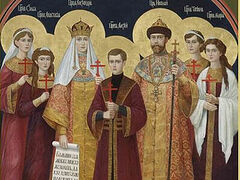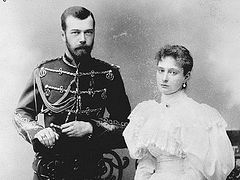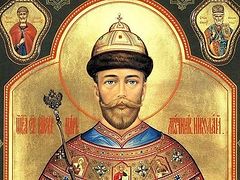In the year when it was decided to canonize the holy Royal Martyrs, I was still far from the Church. But when I heard that they were being canonized, I was terribly outraged: “How could this be? Bloody Sunday [the events of January 9/22, 1905, in St. Petersburg.—Trans.] and all that… I am a historian by profession, and I have known all this very well since the Soviet era… How can it be? What are they up to?!”
Although, it would seem—why should you care about this? People gathered in the Church and established their own rules there. They canonize someone for themselves. And I’m not a member of the Church, so why should you meddle in their business?
However, we always “know everything” and discuss events that do not concern us at all. And so did I; after three years of reasoning and judging I became an active church-goer. I began to sing in the choir and gradually get to know the Lord. I couldn’t escape the illness of all neophytes: having felt the Lord a little, I wanted to tell everyone and everything about Him. I also thought, “Who will listen to a school teacher? But if I become a priest, I will lead thousands and light a fire in people’s hearts with the Word!”[1]
Of course, I had very superficial knowledge and a vague idea about the priestly ministry, but I had a great desire, and that was the most important thing. I prepared for it; I waited till the beginning of the school holidays, when my vacation began, and immediately went to the bishop. I dared to go straight to his house because I was warned:
“Don’t go to the secretary—he won’t let you see the bishop any time soon. Go straight to the bishop!”
And so I went to the bishop and said:
“I want to become a priest!”
The bishop was slightly confused by my boldness, but since there was an acute shortage of priests (schism was spreading all over Ukraine where I lived at that time, and they needed time to fill vacancies at the parishes that had not been taken over yet), and many were ordained without serious spiritual training. Of course, they didn’t ordain men from the street, but those who attended church and understood Church life at least a little. To be sure, later all of them would graduate from theological seminaries, and some from academies—but at that time they were just taught a little and then ordained.
Vladyka gave me a note for the secretary and said, “Go and tell him that I accept you as a candidate.”
This happened twenty years ago, on July 15. The next day I read in the choir a little, and then they took me into the altar.
“Get ready, because you will most likely be ordained at the Sunday service, when the bishop comes to celebrate. So get accustomed to the service and follow it closely,” they said.
And suddenly, on Thursday, July 17, Vladyka entered the altar:
“I’m serving today.”
It came as a complete surprise for everyone. And he turned to me:
“We’re ordaining you today.”
Well, for me it was more than a surprise: “No need to wait for Sunday—I’ll be ordained today!” The service was over—and I became a deacon. The secretary told me:
“Go to the diocesan office and pick up your ordination certificate.”
I went to the diocesan office and picked up the certificate, which read: “Ordained on the feast of the holy Royal Martyrs…”
And then it dawned on me: “How can you, man, with your little mind, meddle in conciliar decisions—in the conciliar mind of the Church?! Look, the Lord has just tapped you on your nose, as if you were a blind kitten...”
The bishop was not planning to serve that day; they had planned to ordain me on Sunday, but everything turned out otherwise… Since then the feast of the Royal Martyrs has been extremely significant for me. As a rule, priests tend to celebrate their priestly ordinations’ anniversaries, but I consider the day of my ordination as a deacon to be very special, because then I clearly understood that the human mind is very imperfect and our reasoning only extends to certain limits. And, for example, if there is a conciliar decision about something in the Church, then we shouldn’t even doubt it. Because the Holy Spirit guides the Council, and if the Council has decided something, it means that it is for the benefit of the Church.
Of course, after that I became interested in the biographies of the Royal Martyrs, began to study documents, and now, when I am reminded of Bloody Sunday and so on, I tell people my story. And I add that we don’t often think about what exactly holiness is. There are different ranks of saints—some are canonized as holy hierarchs, others as martyrs. For example, the fortieth Martyr of Sebaste was a real pagan until the very last moment! But when he voluntarily and consciously entered a freezing cold lake to suffer for Christ’s sake, he became a saint.
So did the Tsar—he could then have sent troops to St. Petersburg and put down the uprising, but he realized that in that case much blood would have been shed. True, much blood was spilled later, but the sovereign hoped that if he left the country would avoid bloodshed. He saw this danger and in order to avoid it he abdicated the throne.
It is difficult for us to comprehend the loftiness of his act, as for us these are just words: “He abdicated”. But imagine that you are an Emperor, that everything is subordinate to you, that you can eat and drink from gold plates, wear gold and cover yourself with gold. But I was at the Livadia Palace in the Crimea, which the Tsar used as his summer retreat, and I didn’t see much gold there. True, everything is arranged conveniently and practically there, but there are no excesses at all. If it is an office, then there are a desk and a sofa for reading. If it’s a library, then again there are chairs and small tables with lamps. It’s the same in the classrooms where the children studied. By the way, the royal children studied without holidays; tell this to your children and grandchildren. They simply did not have vacations; lessons and classes were held all year round, because they had to grow up to be intelligent, well-mannered and live up to their position. And that is in fact how they grew up; the priest who heard their confessions testified:
“If there were more such children, everything in this world would be different.”
And it was also one of the reasons for their canonization: the whole family was very God-fearing.
So imagine that you have unlimited opportunities in a particular country, and you voluntarily give up all this. Which one of you could do that? And for the sake of others! After all, it’s one thing if I do it for myself—for example, I get sick and I can’t bear this cross anymore. But for the sake of others?
They had the opportunity to leave the country several times. Even after the Bolsheviks had already made peace with the Germans, the Germans demanded that they be given the Royal Family, because they wanted to save them. However, the Emperor said that they would not go, and his family supported him—they remained with the suffering people to the end.
The example of their life transformed those who happened to be around. At first the behavior of their guards in Ekaterinburg was rude, unbridled and disgusting. “Yesterday they were at the top, but today we can do as we please with them. So we will kick them and taunt them to our heart’s content!”
But they endured all this so patiently, and they communicated with the soldiers so simply that the soldiers involuntarily began to change their attitude to them. When you see that the Emperor himself talks with you, a commoner, so sincerely—not because he is afraid of you or curries favor with you, but because he is like that—then you begin to change. Those guards were then replaced, because it became clear that they were incapable of shooting the Royal Family. But at the last moment the Bolsheviks appointed men who were capable of such an act.
So the Royal Family gave us an example, that we must always be with the Lord—no matter what may happen, no matter what circumstances we may find ourselves in. And we must always be ready to suffer not only for Christ’s sake, but also for the sake of our neighbor.
So the Royal Family became holy, and now we have them as helpers for each one of us and for our entire country.
[1] A famous line from Alexander Pushkin’s poem, The Prophet.—Trans.






